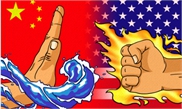
Photo: VCG
Can the ideological divergences between China and the West be diluted, and their shared values be expanded? This is a big question. The US is instigating the West to suppress China, using the cheapest means of inciting Western countries to catapult their ideological differences with China.
The US is intentionally using the difference in ethos between China and the West as a political tool. Cooperation in terms of values has become a popular concept in the West. Certain forces are demarcating the boundaries based on values, with an eye on China. Even some Indians are incited to join this values-based alliance.
Therefore, it is of strategic significance to weaken the conflict between Chinese and Western values and reduce ideological friction.
The systematic difference between China and the West should not be too ideological, nor should it be translated into value conflicts or geopolitics. The US is relentlessly creating a confrontation, while China should act otherwise and explore how countries with different political systems respect and integrate - a challenging task, yet it's worth trying.
We can take the example of the prevailing concept of socialism in the West. The concept of equality in the Chinese socialist system has produced many concrete achievements to commensurate with the pursuit of ordinary people in the West. The pandemic has shed a glittering light on the advantages of China's socialistic system.
China respects life and people's right to health. It resolutely tries to protect people's fundamental interests in times of crisis. On the contrary, in the US, the pandemic fight has been constrained by its system, jeopardized by partisan interests during election campaigns, and subject to capital entangling. It turns out that the poor are the sufferers. In the fight against this pandemic, Chinese society can definitely find common grounds with Western people.
The fundamental value of the leadership of the Communist Party of China (CPC) is that it ensures the superiority of socialism. The CPC is not the kind of Western political parties that center around elections and cater to the interests of only certain groups. The mission of the CPC is to make the country strong, infuse happiness among the people, and promote world peace.
The CPC has led the country to achieve development goals. To be honest, the West has no right to demonize China's political system. Take just one example - in the last 30 years, China has never been involved in a war. Can any major Western country claim the same? Then, why do they allege that China is aggressive and offensive?
The ideological frictions between China and the West are mainly reflected in the different understandings of the "freedom of speech" and the Western intervention in Chinese affairs in this regard. China has the room to reduce the number and intensity of China-West frictions and not let the conflicts become a pivotal point of clash in China-West ties.
China should coordinate Article 1 and Article 35 of its Constitution and reach the maximum social consensus. On the one hand, one's opinion in China must adhere to the Constitution and not clash with China's fundamental political system. On the other hand, speech needs more room on the condition that it does not breach the Constitution. No matter government officials or vocal intellectuals, they should stick to this principle and reduce internal conflicts. This will impair the excuse of external interference in Chinese affairs.
In the field of diplomacy, as China's strength and confidence increase, we will enhance our ability to withstand anti-China rhetoric. Even if an anti-Chinese farce appears in the outside world, let it be, so that we can reduce friction with them.
From a long-term perspective, the process of China's rise must include our compatibility of values with the outside world. This will emerge when we manifest strong evidence of our just actions. This will also come from taking appropriate initiatives to cope with the outside world and leading China's relations with the world, especially the West. US state organs will always find China's ideological shortcomings, but melting value confrontation with the West is not strategically insurmountable.
Perhaps we need to attach a bit more strategic importance to as well as having the confidence in easing the conflict with Western values. The adjustment benefits our internal stability and improves diplomatic relations. It is necessary to make the US realize that it is costly to suppress China with ideological tools, and the fatuous China policy of the US will turn out to be an isolated one.
This is not difficult. However, only when things are challenging to accomplish, they matter. This is the wisdom of Chinese people and strategic go-ahead.
The author is editor-in-chief of the Global Times. opinion@globaltimes.com.cn




